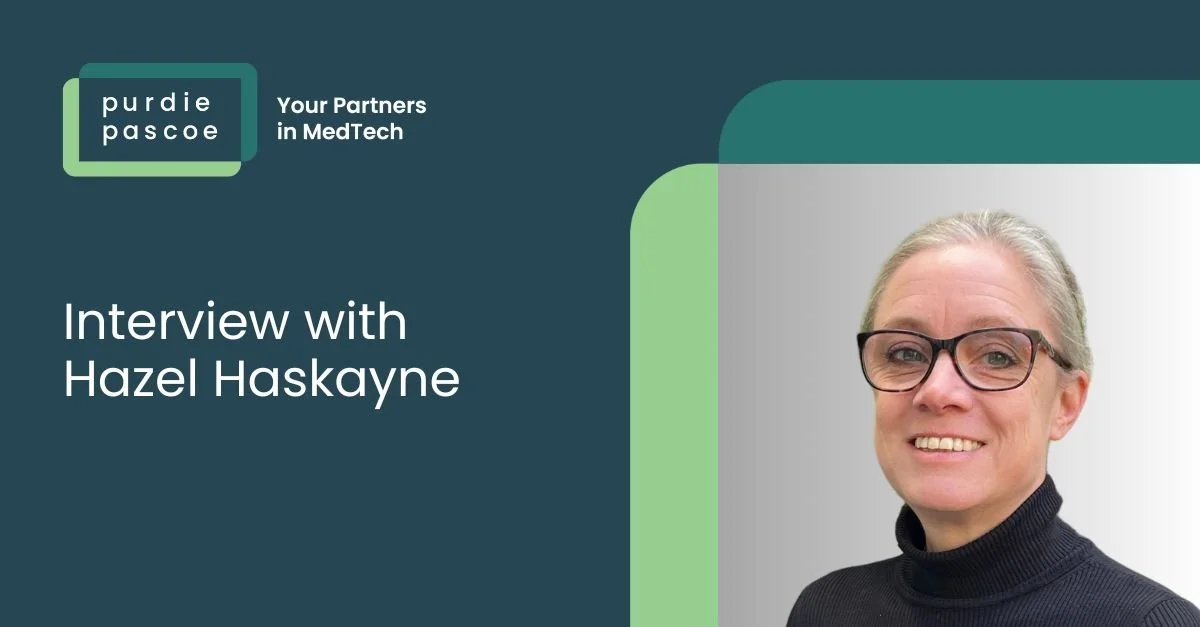Spotlight on qualitative research in MedTech
Interview with Hazel Haskayne, Director
In the fast-evolving world of MedTech, qualitative market research is a vital compass for innovation. While quantitative data can reveal what is happening, qualitative insights uncover the why; shedding light on patient experiences, clinician workflows, and unmet needs that numbers alone can't capture. By diving deep into real-world perspectives, MedTech companies can design more intuitive devices, craft compelling value propositions, and navigate complex regulatory and reimbursement landscapes with greater confidence.
Q. Hazel, please can you provide a quick introduction?
Sure! I’m Hazel Haskayne, I joined Purdie Pascoe at the start of the year and have over 25 years’ experience in market research. While I have worked in a number of different industries throughout my career, my core focus has been healthcare and life science. I find it fascinating to see how medical devices don’t just solve technical problems, they become part of people’s daily lives, clinical routines and care journeys.
Q. Given your expertise as a qualitative practitioner, can you share why you are so passionate about qualitative research?
Well, how much time have we got? I could talk about this all day. Qualitative research isn’t about just asking questions or seeking answers to fully formed questions, it’s far more unique. Done well it allows us to access something truly inspiring and insightful, human stories, the narratives behind data points, real life experiences, perceptions, interactions and needs. It reveals the moments that matter, for example the hesitation a nurse feels when using a new device during a critical procedure, the relief a patient experiences when a technology finally fits into their lives with little disruption, or the workaround a clinician has developed because existing solutions haven’t quite delivered what they need.
These moments can’t really be captured in a survey. They come alive through conversation, observation and, importantly, deep listening. When a MedTech company acts on these insights, they don’t just drive adoption and usage, they create solutions that genuinely improve lives.
That’s what keeps me passionate about qualitative MedTech research; knowing that the stories we uncover today will feed into evolutions and innovations for tomorrow.
Q. What unique value does qualitative research bring to MedTech that quantitative methods might miss?
Quantitative research is excellent for telling you what is happening and how often i.e. adoption rates, satisfaction scores, usage frequency. But qualitative research answers the critical why and how that drives meaningful innovation.
For instance, quantitative data might show that a surgical device has a 20% abandonment rate after initial purchase. Qualitative conversations reveal why: perhaps the training doesn't account for real-world OR workflows, or the device requires a setup time that disrupts established team dynamics, or it solves one problem while creating another that respondents may not mention in a survey.
Qualitative methods also capture context, emotion, and nuance. We learn about the patient who doesn't use their monitoring device not because it's complicated, but because it reminds them that they are sick. We discover that clinicians love a technology's functionality but won't recommend it because of how it affects their relationship with patients. These contextual insights are what transform good products into transformative ones.
Q. How does qualitative research help uncover unmet clinical or patient needs in real-world settings?
Qualitative research shines in uncovering needs that people themselves might not be able to articulate or feel comfortable to. Through in-depth conversations that encourage free-flow narrative responses, and immersive research techniques, we identify gaps that exist in the space between current solutions and actual practice.
For example, by using projective recall techniques, we place clinician minds back to their natural environment (we would ideally be standing with them in the physical realm, but that is rarely possible!), we might notice repetitive workarounds, moments of frustration, or safety concerns that have become normalised. By speaking with patients in their homes, or engaging with them via longitudinal online communities, we discover how devices fit (or don't fit) into the complex reality of managing multiple conditions, family responsibilities, and daily routines.
Qualitative research also explores the ‘jobs to be done’ in healthcare contexts. For example, a diabetes monitoring device isn't just measuring glucose, it might need to provide reassurance or enable independence for caregivers. Understanding these deeper needs allows MedTech companies to innovate in ways that create genuine value.
Q: What are some common misconceptions about qualitative research in the MedTech industry?
One major misconception is that qualitative research is ‘just anecdotal’ or less rigorous than quant. In reality, well-designed qualitative research follows systematic methodologies, rigorous analysis frameworks, and established quality standards. It's not about collecting random stories, it's about strategic sampling, careful questioning that encourages narrative flows, and expert interpretation.
Another misconception is that qualitative research can't inform decision-making because it involves small sample sizes. But we are never trying to be statistically representative, it's trying to be contextually comprehensive. Fifteen well-selected interviews can reveal the full spectrum of experiences and needs within a target customer group, providing actionable insights that a survey of 50 or 100 clinicians might miss.
Finally, some believe qualitative research is only useful at the early innovation stage. In truth, it's valuable throughout the product lifecycle, from initial need identification through design iteration, launch strategy, and ongoing communications. The questions change, but the value of deep human insight remains constant.
Q: How do you balance the depth of qualitative insights with the need for scalability and speed in product development?
This is where research design is pivotal. We don't have to choose between depth and speed; we need to match the method to the central business question and the development stage.
The key is being strategic about when you need broad directional insights versus deep behavioural understanding and designing research that delivers the right type of insight at the right stage of product development. Quick doesn't have to mean superficial, and deep doesn't have to mean slow.
Q: What makes Purdie Pascoe’s expertise unique?
To put it simply, dedication and experience! We have been focused on MedTech since 2008 and have vast experience within our business. We have invested in our people and technology to ensure we stay at the forefront of advanced qualitative offerings.
We don’t just do things for the sake of it, we ensure every engagement is designed to deliver what is needed, stays action focused and we work in partnership with our clients every step of the way.
Q: Looking ahead, how do you see the role of qualitative research evolving as MedTech becomes more data-driven and AI-enabled?
Rather than diminishing the role of qualitative research, AI and other technologies are actually amplifying its importance, because they raise new questions that only human-centered research can answer.
As devices become more connected and generate more data, we need qualitative research to understand how clinicians and patients interpret and act on that data. Does an alert create helpful awareness or alarm fatigue? Does a dashboard empower or overwhelm? AI might predict what users will do, but qualitative research reveals why they do it and how they feel about it.
We're also seeing qualitative research become essential in addressing AI ethics, algorithmic bias, and human-AI collaboration in clinical settings. As MedTech incorporates machine learning, we need to understand trust, transparency needs, and the human factors that determine whether clinicians will rely on AI-generated recommendations. We are already seeing an evolution of scepticism turn to excitement, then calm into preference for more manual solutions.
Looking forward, I expect qualitative research will become even more integrated into agile development processes, with rapid insights informing iterative design. We'll also see growth in hybrid methodologies that include short AI moderated ‘discussions’ to drive scale of understanding, be combined with deeper, focused of qualitative engagements.
The human element won't disappear - it will become more central as technology becomes more sophisticated.

